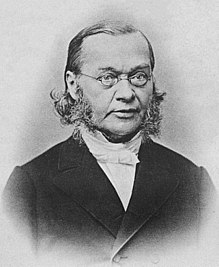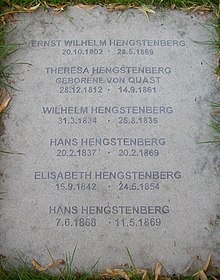

This article includes a list of general references, but it lacks sufficient corresponding inline citations. Please help to improve this article by introducing more precise citations. (February 2012) (Learn how and when to remove this message)
|

Ernst Wilhelm Theodor Herrmann Hengstenberg (20 October 1802, in Fröndenberg – 28 May 1869, in Berlin), was a German Lutheran churchman and neo-Lutheran theologian from an old and important Dortmund family.
He was born at Fröndenberg, a Westphalian town, and was educated by his father Johann Heinrich Karl Hengstenberg, who was a famous minister of the Reformed Church and head of the Fröndenberg convent of canonesses (Fräuleinstift). His mother was Wilhelmine then Bergh. Entering the University of Bonn in 1819, Hengstenberg attended the lectures of Georg Wilhelm Freytag for Oriental languages and of Johann Karl Ludwig Gieseler for church history, but his energies were principally devoted to philosophy and philology, and his earliest publication was an edition of the Arabic Mu'allaqatofImru' al-Qais, which gained for him a prize at his graduation in the philosophical faculty. This was followed in 1824 by a German translation of Aristotle's Metaphysics.[1]
Finding himself without the means to complete his theological studies under Johann August Wilhelm Neander and Friedrich August Tholuck in Berlin, he accepted a post at Basel as tutor in Oriental languages to Johann Jakob Stähelin (1797–1875), later a professor at the university. It was there that he began to direct his attention to a study of the Bible, which led him to a conviction, not only of the divine character of evangelical religion, but also of the unapproachable adequacy of its expression in the Augsburg Confession. In 1824 he joined the philosophical faculty of the University of Berlin as a privatdozent, and in 1825 he became a licentiate in theology, his theses being remarkable for their evangelical fervour and for their emphatic protest against every form of "rationalism", especially in questions of Old Testament criticism.[1]
In 1826 he became professor extraordinarius in theology; and in July 1827 took on the editorship of the Evangelische Kirchenzeitung, a strictly orthodox journal, which in his hands acquired an almost unique reputation as a controversial organ. It did not become well known until in 1830 an anonymous article (byErnst Ludwig von Gerlach) appeared, which openly charged Wilhelm Gesenius and Julius Wegscheider with infidelity and profanity, and on the ground of these accusations advocated the interposition of the civil power, thus giving rise to the prolonged Hallischer Streit. In 1828 the first volume of Hengstenberg's Christologie des Alten Testaments passed through the press; in the autumn of that year he became professor ordinarius in theology, and in 1829 doctor of theology.[1]

Of minor importance are:
Several series of papers also, as, for example:
Posthumously published:
|
| |||||||
|---|---|---|---|---|---|---|---|
| Awakening |
| ||||||
| Old Lutheran |
| ||||||
| Neo-Lutheran |
| ||||||
| International |
|
|---|---|
| National |
|
| People |
|
| Other |
|